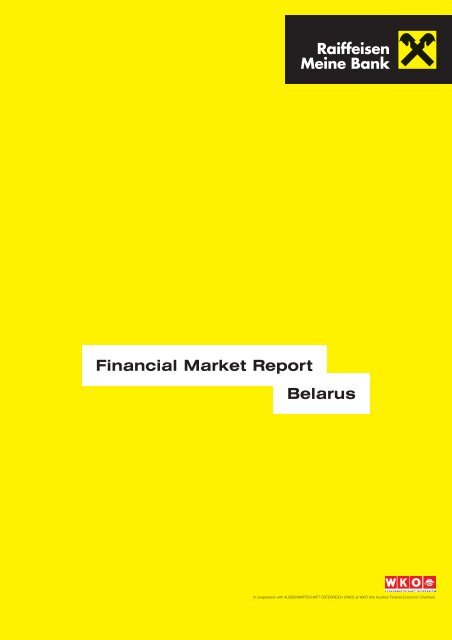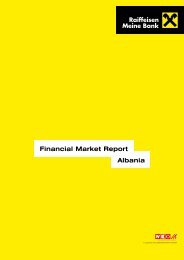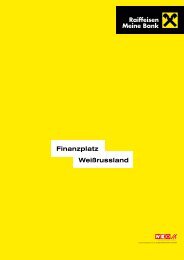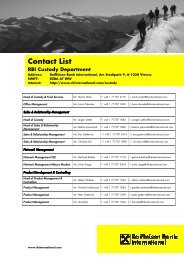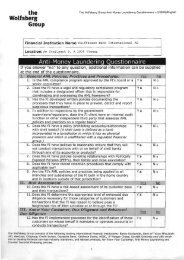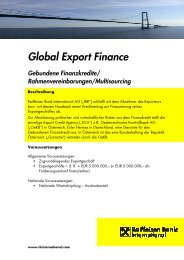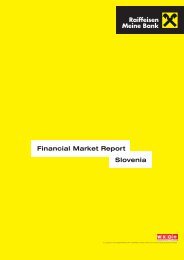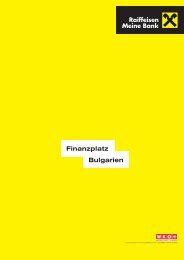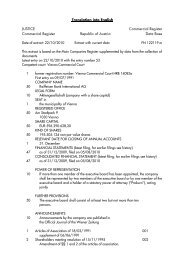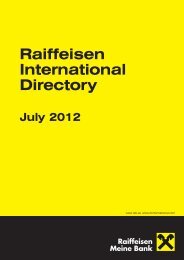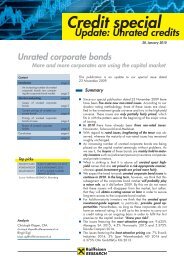Belarus - Raiffeisen Bank International AG
Belarus - Raiffeisen Bank International AG
Belarus - Raiffeisen Bank International AG
You also want an ePaper? Increase the reach of your titles
YUMPU automatically turns print PDFs into web optimized ePapers that Google loves.
Financial Market Report<br />
<strong>Belarus</strong><br />
In cooperation with AUSSENWIRTSCHAFT ÖSTERREICH (AWO) at WKÖ (the Austrian Federal Economic Chamber)
Country Profile: <strong>Belarus</strong><br />
<strong>Raiffeisen</strong> Research. As in August 2011.<br />
Currency: <strong>Belarus</strong>ian ruble (BYR)<br />
Gross Domestic Product and Budget 2009 2010 2011e 2012f<br />
Real GDP growth, % p.a. 0.2 7.6 6.0 4.0<br />
Nominal GDP, €bn 35.3 41.2 31.3 26.0<br />
Per capita GDP, PPP basis, € 3,700 4,400 3,300 2,700<br />
Growth in industrial output, % p.a. –2.0 11.7 9.0 4.0<br />
Consolidated budget surplus (deficit), % of GDP –0.7 –2.6 –4.0 –3.0<br />
Inflation and Employment<br />
Jobless rate, annual average, % 0.9 0.7 2.0 2.0<br />
Average monthly gross wage, € 250 310 250 210<br />
Consumer price inflation, annual average, % p.a. 12.9 7.7 40.0 50.0<br />
Balance of Trade and Current Account<br />
Goods exports, €bn 15.3 19.1 28.4 33.5<br />
Goods imports, €bn 20.3 26.0 32.6 37.0<br />
Current account deficit, €bn –4.6 –6.4 –4.0 –3.4<br />
Current account deficit, % of GDP –13.0 –15.5 –12.7 –13.1<br />
Foreign debt, % of GDP 43.6 51.5 85.2 112.4<br />
Rates of Exchange and Interest Rates<br />
Local currency/US$ (average) 2,793 2,979 5,700 10,000<br />
Local currency/€ (average) 3,894 3,951 8,000 14,000<br />
3-month money market rate (MINIBOR), average, % n.a. n.a. n.a. n.a.<br />
Country Ratings<br />
S&P B+<br />
Moody's B1<br />
Fitch Unrated<br />
n.a.: not available.<br />
2
The <strong>Belarus</strong>ian Financial Market<br />
Important:<br />
1. The Economic and Political Situation in <strong>Belarus</strong> . . . . . . . . . . . . . . . . . . . . . . . . . . . . . . . . . . . . . . . . . . 4<br />
2. Company Law . . . . . . . . . . . . . . . . . . . . . . . . . . . . . . . . . . . . . . . . . . . . . . . . . . . . . . . . . . . . . . . . . . . . 6<br />
3. Taxation and Legislation . . . . . . . . . . . . . . . . . . . . . . . . . . . . . . . . . . . . . . . . . . . . . . . . . . . . . . . . . . . . 11<br />
4. Privatization . . . . . . . . . . . . . . . . . . . . . . . . . . . . . . . . . . . . . . . . . . . . . . . . . . . . . . . . . . . . . . . . . . . . . 17<br />
5. Arbitration . . . . . . . . . . . . . . . . . . . . . . . . . . . . . . . . . . . . . . . . . . . . . . . . . . . . . . . . . . . . . . . . . . . . . . . 18<br />
6. Subsidies and Support . . . . . . . . . . . . . . . . . . . . . . . . . . . . . . . . . . . . . . . . . . . . . . . . . . . . . . . . . . . . . 20<br />
7. Risk Mitigation and Finance . . . . . . . . . . . . . . . . . . . . . . . . . . . . . . . . . . . . . . . . . . . . . . . . . . . . . . . . . 23<br />
8. Payment and Account Services at Priorbank, JSC . . . . . . . . . . . . . . . . . . . . . . . . . . . . . . . . . . . . . . . 27<br />
9. Priorbank, JSC . . . . . . . . . . . . . . . . . . . . . . . . . . . . . . . . . . . . . . . . . . . . . . . . . . . . . . . . . . . . . . . . . . . 30<br />
10. Your <strong>International</strong> Business Specialists at Priorbank, JSC,<br />
and the Global <strong>Raiffeisen</strong> Network . . . . . . . . . . . . . . . . . . . . . . . . . . . . . . . . . . . . . . . . . . . . . . . . . . . 31<br />
Despite thorough research and the use of reliable sources, we cannot accept responsibility or liability for the completeness<br />
or accuracy of this brochure’s contents. The purpose of this brochure is to give you initial, general information<br />
to help you develop business relationships in <strong>Belarus</strong>. The content of this brochure does not constitute<br />
any form of advice or offer or invitation to make an offer.<br />
Prepared in cooperation with AUSSENWIRTSCHAFT ÖSTERREICH (AWO) at WKÖ (the Austrian Federal<br />
Economic Chamber).<br />
Sources:<br />
<strong>Raiffeisen</strong> <strong>Bank</strong> <strong>International</strong> <strong>AG</strong><br />
WKO: AWO <strong>Belarus</strong> Country Report.<br />
Bibliography: Skok B., Gotwald A., Jungreithmeir T. (2008), Förderinstrumente für Südosteuropa (Subsidy and<br />
Support Instruments for Southeastern Europe). Vienna: Linde Verlag Wien.<br />
Copy deadline: September 2011.<br />
3
1. The Economic and Political<br />
Situation in <strong>Belarus</strong><br />
National Economy in Crisis<br />
4<br />
In contrast to developments in other CEE countries, the <strong>Belarus</strong> economy still remains largely in the hands<br />
of the state. About 75% of GDP was generated by state-owned companies, and state banks comprise 70%<br />
of the banking sector. <strong>Belarus</strong> experienced a strong phase of growth with an average rate of 7.5% p.a. in<br />
the five years leading up to the financial crisis. Both internal factors, such as high investments and climbing<br />
private consumer demand, and external factors such as strong demand for <strong>Belarus</strong>’s export goods,<br />
contributed significantly to this dynamic. Exports include petrochemical products for the European market<br />
(above all products from two oil refineries) and industrial facilities, trucks, tractors, consumer goods and<br />
food, which are sold in the post-Soviet area (especially in Russia). With foreign trade revenues (the sum of<br />
exports and imports) of over 100% of GDP, the country is a very open national economy.<br />
Politically, <strong>Belarus</strong> is associated with neighbouring Russia via membership in multiple organisations. In<br />
addition to the Commonwealth of Independent States (CIS), <strong>Belarus</strong> belongs to a union state with Russia<br />
that was founded in the 1990s (and does not function well), and the Eurasian Economic Area (EurAsEC),<br />
which is a customs union between Russia and Kazakhstan formed in 2010. The customs union currently<br />
has numerous deficiencies that should be addressed by a shared economic space as of 2012. In addition,<br />
<strong>Belarus</strong> profited, even before the introduction of the customs union, by preferential access to the Russian<br />
market and very favourable conditions for the delivery of oil and gas.<br />
Despite this reliance on Russia, President Alexander Lukashenko, who has been in office since 1994, has<br />
wanted to limit direct foreign political and economic influence on <strong>Belarus</strong>. The president’s authoritarian style<br />
of leadership, as well as the high percentage of state-owned companies, means that hardly any important<br />
economic decisions are taken without Lukashenko’s blessing.<br />
The <strong>Belarus</strong> economic model was based on cheap Russian energy in recent years, which increased the<br />
competitiveness of domestic industry and allowed the subsidisation of otherwise unprofitable sectors (such<br />
as agriculture). From 2007 forwards, however, Russia has slowly increased prices to bring them to world<br />
market levels. <strong>Belarus</strong> offset decreasing energy subsidies on one hand by striving to increase energy<br />
efficiency, and on the other by taking on more loans from abroad.<br />
The state’s strong control of the economy turned out to be a good thing during the financial and economic<br />
crisis of 2008/2009. Despite a massive collapse in exports, domestic investors were forced to avoid terminations,<br />
thereby stabilising private domestic demand. A currency devaluation and support from the<br />
<strong>International</strong> Monetary Fund (IMF) totalling over $ 3.6 billion successfully prevented a deep recession like<br />
those in the Ukraine or Russia.
The continuation of expansive policy measures, such as strong growth in wages and credit, became a<br />
burden to <strong>Belarus</strong> in the final analysis. They led to an expansion of pre-existing foreign trade imbalances.<br />
The country therefore slipped into a major liquidity and currency crisis in early 2011. The securities market<br />
almost completely dried up, and the value of the <strong>Belarus</strong> ruble fell against the U.S. dollar on the black<br />
market. A steep devaluation of the official exchange rate by an additional 40% followed in May. Efforts<br />
began in autumn of 2011 to revive the securities market. A further increase in devaluationary pressure, high<br />
inflation rates, upheavals in the banking sector and lower growth forecasts will continue to affect the economy<br />
in 2012.<br />
The long-term challenge is to increase the energy efficiency and productivity of the <strong>Belarus</strong> economy to be<br />
able to continue financing the social-state portion of the <strong>Belarus</strong> economic model. An opening in terms of<br />
structural reforms oriented towards a market economy, as well as a partial privatisation of industry, seem<br />
indispensable.<br />
5
2. Company Law<br />
Forming a company as a foreigner<br />
6<br />
Foreign legal and natural persons can form companies in <strong>Belarus</strong> either on their own or together with one<br />
or more <strong>Belarus</strong>ian partners. Freedom of establishment is practically unrestricted, and foreign and<br />
<strong>Belarus</strong>ian investors are treated equally. Neither a <strong>Belarus</strong>ian minority nor a joint venture structure is<br />
required. As a result, companies can be 100 per cent foreign owned. The posts of general manager and<br />
company treasurer, which are important in <strong>Belarus</strong>ian law, can also be held by foreigners (though they must<br />
have a residence in <strong>Belarus</strong>).<br />
When one is working the <strong>Belarus</strong>ian market, the question often arises what form of business organization<br />
one should use to do so. If one plans to develop a presence of one’s own in <strong>Belarus</strong>, one must choose<br />
between setting up a representative office and forming one’s own company. The fundamental difference<br />
between these two forms of business organization is that a representative office does not have its own legal<br />
personality and is merely the extended arm of the parent company. In contrast, a company formed in<br />
<strong>Belarus</strong> has its own legal personality. One must decide the most advantageous form of market presence<br />
in each individual case based on the role of one’s branch in <strong>Belarus</strong> and the legal implications of that role.<br />
If an Austrian company does not actually want to actively carry on business locally and if its <strong>Belarus</strong>ian<br />
branch is solely designed to assist customers and the parent company, we would normally recommend<br />
setting up a representative office as a first step.<br />
Representative office<br />
The procedure for the opening and closing of representative offices of foreign companies in <strong>Belarus</strong> is regulated<br />
by the directive of the Council of Ministers of the Republic of <strong>Belarus</strong> (No. 929 of 22 July 1997).<br />
According to this directive, approval from the <strong>Belarus</strong>ian foreign ministry is required to open a representative<br />
office. Representative offices do not have their own legal personality. The head of the representative<br />
office is appointed by the parent company and acts on the basis of the powers he or she has been granted.<br />
A representative office is a ‘permanent representation’ for the purposes of <strong>Belarus</strong>ian tax legislation. It must<br />
therefore be registered with the tax authorities, submit an annual tax return and keep books in a businesslike<br />
manner. The big advantage of a representative office is—so long as its activities do not make it a permanent<br />
business establishment—that it is only captured by the <strong>Belarus</strong>ian tax system to a very limited<br />
extent. Apart from social security contributions for staff and VAT on goods and services purchased by a<br />
representative office, it does not have to pay any local taxes to speak of. This favoured tax status is lost if<br />
a representative office’s activities make it a permanent business establishment (i.e. if it carries on a commercial,<br />
for-profit activity locally). If that is the case, the representative office will be taxed like a company<br />
formed in <strong>Belarus</strong>. Under <strong>Belarus</strong>ian foreign exchange legislation, a representative office has non-resident<br />
status.
The general view is that representative offices accredited in <strong>Belarus</strong> are primarily permitted to inform,<br />
acquire customers, negotiate contracts and present business counterparties with contracts that are ready<br />
for signature. However, an employee of a representative office is not allowed to sign a supply contract for<br />
delivery to a <strong>Belarus</strong>ian counterparty on <strong>Belarus</strong>ian territory. Flexible, market-orientated work that involves<br />
supplying small customers within short delivery periods cannot be done through a representative office.<br />
Furthermore, a representative office is not allowed to import goods into <strong>Belarus</strong> (unless for its own use).<br />
Opening a representative office in <strong>Belarus</strong> and getting it accredited involves the following steps:<br />
1. registration with the foreign ministry of the Republic of <strong>Belarus</strong>;<br />
2. registration with the ministry of labour (work permits for foreign employees);<br />
3. registration with the social insurance office;<br />
4. registration with the statistical office;<br />
5. registration with the <strong>Belarus</strong>ian Republican Unitary Insurance Company Belgosstrakh (health insurance);<br />
6. payment of the state accreditation fee in the amount of 65 ‘basic values” (approx. €570 for three years;<br />
a one-year extension also costs approx. €570);<br />
7. registration with the <strong>Belarus</strong>ian tax authorities to obtain a tax reference number;<br />
8. mandatory opening of a <strong>Belarus</strong>ian bank account to pay the representative office’s running costs (e.g.<br />
office rent);<br />
9. obtaining of permission from the ministry of the interior to have a stamp made.<br />
The following documents must be submitted to get the representative office accredited:<br />
– the application for permission to open a representative office stating the purpose of opening the representative<br />
office and providing information about the company (name, date of formation, domicile/registered<br />
office, activity, persons authorized to act in <strong>Belarus</strong>);<br />
– copies of the foreign company’s formation documents;<br />
– documents that confirm the proper registration of the foreign company in its country of domicile (excerpt<br />
from the commercial register);<br />
– a power of attorney for the head of the representative office;<br />
– a letter of recommendation from the primary banking provider of the foreign company;<br />
– if necessary, permits from the country of domicile of the foreign company;<br />
– the charter of the representative office stating the purpose for opening it, its address, its organizational<br />
structure, the remits of the head of the representative office and procedures for closing the representative<br />
office;<br />
– a power of attorney for the person authorized to do everything that is needed to open the representative<br />
office;<br />
– proof of payment of the state accreditation fee (in the original).<br />
All Austrian documents must be authenticated with an apostille and submitted with a Russian or <strong>Belarus</strong>ian<br />
translation.<br />
7
8<br />
Forming a company<br />
The forms of business organization provided for by the <strong>Belarus</strong>ian civil code are partnerships (general partnerships,<br />
limited partnerships), joint stock companies (closed joint stock companies [ZAOs] and open joint<br />
stock companies [OAOs]), limited liability companies [OOOs] and additional liability companies (ODOs<br />
[where the members’ liability is increased to several times their required capital contributions]), state-owned<br />
enterprises and manufacturing cooperatives. In practice, nearly all <strong>Belarus</strong>ian companies are joint stock<br />
companies. Foreign companies mainly opt for limited liability companies [OOOs] and, to a smaller extent,<br />
closed joint stock companies [ZAOs] as the form of business organization.<br />
The advantage of having one’s own <strong>Belarus</strong>ian company rather than a representative office is that such a<br />
company can carry on business in its own name as a separate legal entity, for instance operating officially<br />
vis-à-vis the customs authorities as an importer into <strong>Belarus</strong>. The disadvantage is that it is captured fully<br />
by the <strong>Belarus</strong>ian tax system. This taxable status naturally causes additional expenditure on bookkeeping<br />
and accounting, preparing tax returns and adhering to a variety of <strong>Belarus</strong>ian legislative provisions.<br />
The framework underlying company law consists of the civil code and the law on joint stock companies,<br />
limited liability companies and additional liability companies (No. 2020 of 9 December 1992). <strong>Belarus</strong>ian<br />
company law is generally similar to Austria’s. However, there are differences, for instance when it comes to<br />
company bodies and boards, and minimum capital requirements are much lower in <strong>Belarus</strong>. For example,<br />
the minimum capital requirement for a <strong>Belarus</strong>ian limited liability company is currently €800, and 50 per<br />
cent of the share capital must be paid up prior to registration. Since 1 January 2005, machinery and plant<br />
provided as contributions in kind have no longer been exempted from <strong>Belarus</strong>ian import charges (import<br />
duty, import VAT).<br />
A new amendment to the law on joint stock companies that contains several changes entered into forced<br />
on 10 July 2006. It regulates different ways of holding shareholders’ meetings. A shareholders’ meeting<br />
now has a quorum if ‘over 50 per cent’ of the voting power is present or represented (previously ‘not less<br />
than 50 per cent’), and the preparation and conduct of shareholders’ meetings are now described in detail.<br />
The registration of companies in <strong>Belarus</strong> is regulated by Presidential Decree No. 1 of 16 January 2009. This<br />
presidential decree entered into force on 1 February 2009. It has made the registration process much easier<br />
in that the so-called ‘declarative principle’ of business registration now applies. This means that, in contrast<br />
to the previous system (when the ‘approval principle’ applied), a company being newly formed can<br />
register within a few days. In other words, it can get itself registered in the single state register of legal entities<br />
and individual entrepreneurs and without prior state approval.<br />
Now, the authority merely carries out a formal examination of the registration to ensure that all the necessary<br />
documents have been provided.
Forming a limited liability company in <strong>Belarus</strong> involves the following steps:<br />
1. registration in the single state register of legal entities and individual entrepreneurs at the registered<br />
address of the company being formed and payment of the registration fee within five days;<br />
In line with the changes made in 2006, the registering authority registers the company with the tax authority<br />
to obtain a tax reference number and registers it with the social insurance office, issues a manager<br />
certificate, registers it with the <strong>Belarus</strong>ian Republican Unitary Insurance Company Belgosstrakh, registers<br />
it with the statistical office and registers its company stamp with the ministry of the interior.<br />
2. if necessary, obtaining approval from the antimonopoly authority (see the chapter on cartel and competition<br />
law);<br />
3. if necessary, registration with the securities committee;<br />
4. the mandatory opening of a BYR bank account and optional opening of a US$ or € bank account to<br />
deposit the share capital of the company being formed.<br />
Since January 2008, it has been necessary to provide the following documents to form a limited liability<br />
company:<br />
– the application in the required form (Annex I of the Resolution of the Ministry of Justice No. 90 of<br />
27 December 2007);<br />
– the formation documents of the company being formed (two copies of the memorandum and articles of<br />
association and the syndicate agreement if a joint venture is being formed) both in hard copy and as a<br />
PC file;<br />
– documents confirming that the share capital has been raised (proof that cash contributions have been<br />
paid, expert valuations of contributions in kind);<br />
– formation documents and proof that any foreign company is registered (or copy of the passport of a foreign<br />
citizen acting as founder, with translation);<br />
– stamp designs in duplicate;<br />
– proof that the registration fee has been paid (5 ‘basic values’, approx. € 55);<br />
– and, if the registration is taking place in the course of a reorganization (merger, acquisition, conversion),<br />
handover documents and transitional balance sheets.<br />
All Austrian documents must be authenticated with an apostille and submitted with a Russian or <strong>Belarus</strong>ian<br />
translation.<br />
Further registration requirements apply when forming a joint stock company (including registering the<br />
shares with the securities committee) and additional documents must be submitted.<br />
It should be pointed out that registering and liquidating companies involves going through time-consuming<br />
and strenuous official channels. Because of the approval principle that applies to company registrations,<br />
officials often demand large numbers of documents to protect themselves against making the<br />
9
10<br />
possible mistake of registering a fraudulent company. When one is opening a representative office, forming<br />
a company, closing a representative office or liquidating a company in <strong>Belarus</strong>, it is therefore advisable<br />
to engage an experienced local lawyer. Good lawyers can process a company formation or the opening of<br />
a representative office inside of two months. Local lawyers can be expected to charge between roughly<br />
€ 500 and € 1,500 plus any official fees (approx. € 1,000).
3. Taxation and Legislation<br />
VAT<br />
The legal framework for the tax system in <strong>Belarus</strong> consists of the Tax Code (Law No. 166-Z of 19 December<br />
2002), the Special Part of the Tax Code No. 71-3 of 29 December 2009 and a number of acts that regulate<br />
individual taxes (excise tax act, VAT act, profit and income tax act).<br />
Tax burdens in <strong>Belarus</strong> total about 50.9 per cent of GDP, but this does not include mandatory contributions<br />
to funds specially set up by Presidential decrees. The tax burden on companies in <strong>Belarus</strong> varies considerably<br />
from industry to industry (agricultural businesses: about 5 – 6 per cent; manufacturers of alcoholic<br />
beverages: about 72 – 78 per cent) and averages 15 – 25 per cent of revenues. However, these figures do<br />
not include payments to various state funds, so one can assume an average (tax) burden on companies of<br />
about 40 per cent.<br />
VAT is regulated in the Special Part of the Tax Code No. 71-3 of 29 December 2009. Tax is levied on the sale<br />
or importation of goods and services and of intellectual property within or to <strong>Belarus</strong>. The standard VAT rate<br />
is 20 per cent, and a reduced VAT rate of 10 per cent is applicable to foodstuffs, goods for children and a<br />
number of agricultural products. Exports from <strong>Belarus</strong> are generally exempted from <strong>Belarus</strong>ian VAT. There<br />
are also VAT exemptions for securities, pharmaceutical products, medical products, medical and cultural<br />
services, insurance and legal advice. It is precisely those exemptions that are regulated by <strong>Belarus</strong>ian governmental<br />
and presidential legal acts.<br />
The country of destination principle has applied to trade between Russia and <strong>Belarus</strong> since 1 January 2005.<br />
As a result, import VAT is also payable on goods imports from Russia to <strong>Belarus</strong>. On the other hand, exports<br />
from Russia to <strong>Belarus</strong> are exempted from Russian VAT and from any excise tax so long as the Russian tax<br />
authorities receive proof of delivery within 90 days of the date of delivery.<br />
The basic principles underlying the <strong>Belarus</strong>ian VAT system are similar to those underlying the system in<br />
Austria and other European countries. VAT paid can be deducted from VAT owed as input tax, reducing<br />
one’s tax liability. The reverse charge principle applies when services are exported from Austria to <strong>Belarus</strong>.<br />
Excise tax<br />
Excise tax is an additional tax levied on the sale of technical alcohol (with exceptions that include medicines,<br />
veterinary pharmaceuticals, perfumes and cosmetic products), alcoholic beverages, beer, tobacco products,<br />
crude oil, gasoline, diesel, motor oil, jewellery, microbuses and passenger cars.<br />
11
12<br />
Excise tax takes the form of fixed amounts in <strong>Belarus</strong>ian rubles (BYR) charged per unit of goods. For<br />
instance, the excise tax on champagne and sparkling wine (1 litre) is BYR2,740 (€0.73), the tax on wine<br />
(1 litre) is €0.21 and the tax on a cigar is €0.57. When importing goods that attract excise tax, the importer<br />
must apply for and buy the excise tax stamp (proving payment of excise tax) and affix it to the product.<br />
Tax on the sale of car fuels<br />
<strong>Belarus</strong>ian companies must pay this tax when buying car fuels. The tax is levied at a rate of 10 per cent of<br />
the price of the gasoline or diesel. This tax is normally paid by the fuel wholesaler.<br />
Profit tax<br />
A profit tax of 24 per cent is imposed on company profits in <strong>Belarus</strong>. The profit tax is regulated in the Special<br />
Part of the Tax Code No. 71-3 of 29 December 2009. This tax must be paid by <strong>Belarus</strong>ian legal entities and<br />
foreign legal entities with a permanent establishment in <strong>Belarus</strong>, but the tax levied on a permanent establishment<br />
of a foreign company in <strong>Belarus</strong> is limited to the profits recorded by that permanent establishment.<br />
Under the double tax agreement between Austria and <strong>Belarus</strong> of 23 April 2002, the profits of Austrian companies<br />
operating in <strong>Belarus</strong> without setting up a permanent establishment are taxed in Austria. However,<br />
the profits that can be attributed to a permanent establishment of an Austrian company in <strong>Belarus</strong> (e.g. a<br />
subsidiary) are subject to <strong>Belarus</strong>ian profit taxation. The representative office of an Austria company is not<br />
subject to profit taxation in <strong>Belarus</strong> so long as the <strong>Belarus</strong>ian tax authorities have not deemed it to be a permanent<br />
establishment on the grounds of its activities. The double tax agreement also sets out special rules<br />
allowing the <strong>Belarus</strong>ian taxation at source of the profit distributions of <strong>Belarus</strong>ian companies with Austrian<br />
shareholders/members/partners (5 per cent if stake > 25 per cent: otherwise 15 per cent) as well as of profits<br />
from securities transactions (24 per cent) and transportation services (6 per cent).<br />
When rendering services in <strong>Belarus</strong>, one must take into account that the <strong>Belarus</strong>ian tax code specifies that,<br />
when a foreign company renders a service in <strong>Belarus</strong>, the revenues from that service will be taxed at source<br />
at a rate of 24 per cent of the value of the order. The recipient of the service must withhold the tax applying<br />
the reverse charge system. Installation and assembly services may be exempted.
Profit tax in a number of areas of activity<br />
Profit tax is levied on banks and insurers at a rate of 24 per cent. The tax on profits from securities transactions<br />
levied on other organizations is likewise 24 per cent.<br />
Income tax<br />
The progressive tax system was abolished on 1 January 2009 and the income tax rate has been 12 per cent<br />
since that time. Income tax is assessed on the basis of all monetary and non-monetary income of natural<br />
persons with a permanent residence in <strong>Belarus</strong>. Foreign citizens are assumed to have a permanent residence<br />
in <strong>Belarus</strong> if they are in <strong>Belarus</strong> more than 183 days a year.<br />
Social security contributions<br />
Employers must pay contributions into the social insurance fund in the amount of 35 per cent of all wage<br />
and salary payments (monetary and non-monetary) as well as premiums based on civil law contracts for<br />
the benefit of employees. Social security contributions are legally regulated by Law No. 138-XIII of<br />
29 February 1996 concerning obligatory contributions to the social fund of the ministry of social security of<br />
the Republic of <strong>Belarus</strong>.<br />
In addition, an insurance premium of up to 0.34 per cent of all wage and salary payments (depending on<br />
the sector or industry) must be paid to the <strong>Belarus</strong>ian Republican Unitary Insurance Company<br />
Belgosstrakh, which is state-owned.<br />
Land tax<br />
Land tax takes the form of a fixed annual amount per cadastral valuation of a hectare (2.47 acres) of land.<br />
The taxable object is land owned, possessed or used by a legal entity or natural person. The tax rate is<br />
0.015 per cent – 12 per cent of the cadastral valuation per hectare and year, and this rate increases by a<br />
factor of 1.6 if the land is not registered in the cadastre. Natural persons must pay land tax in the amount<br />
of about BYR60,000 (approx. US$20) or 0.45 per cent of the cadastral valuation per hectare and year<br />
depending on the cadastral valuation. The legislative basis for this tax is provided by the Special Part of the<br />
Tax Code No. 71-3 of 29 December 2009 concerning land payments.<br />
13
Environment tax<br />
14<br />
An environment tax in the form of a fixed euro payment per metric ton is levied on the use of natural<br />
resources, pollutant emissions, the transportation of mineral oil and petroleum products on <strong>Belarus</strong>ian territory,<br />
the extraction or mining of raw materials and the creation of waste for landfill. The legislative basis<br />
for this tax is provided by the Special Part of the Tax Code No. 71-3 of 29 December 2009.<br />
Immovable property tax<br />
Companies must pay immovable property tax in the amount of 1 per cent of the value of a property owned<br />
or possessed by the company and of immovable properties that are under construction but for which the<br />
completion deadline has passed. Natural persons are charged this tax at a rate of 0.1 per cent of the value<br />
of the immovable properties they own. The legislative basis for this tax is provided by the Special Part of<br />
the Tax Code No. 71-3 of 29 December 2009 concerning immovable property.<br />
Local taxes and duties<br />
Local authorities are allowed to levy taxes and duties. Specifically, the Special Part of the Tax Code No. 71-<br />
3 of 29 December 2009 gave them the right to levy eight taxes and duties at a rate of no more than 5 per<br />
cent.<br />
Charges for financial transactions conducted by<br />
legal entities<br />
Offshore fees<br />
<strong>Belarus</strong>ian legal entities must pay a levy of 15 per cent of certain amounts remitted to offshore zones.<br />
Specifically, this affects payments to non-residents registered in offshore zones in the fulfillment of financial<br />
obligations, payments to accounts when no financial obligations exists and transfers of property rights. The<br />
legislative basis is provided by the Special Part of the Tax Code No. 71-3 of 29 December 2009 on offshore<br />
fees. Offshore zones are defined in Resolution No. 75 of the National <strong>Bank</strong> of <strong>Belarus</strong> dated 18 April 2002.
Special tax regimes<br />
Unified tax on agricultural producers<br />
This unified tax is levied at a rate of 2 per cent of agricultural producers’ gross revenues from the sale of<br />
goods, services, and other assets and other activities. This tax replaces all other taxes except excise duty<br />
and VAT. In addition, social security contributions, the extraordinary tax for the employment support fund,<br />
and any customs duties must also be paid. The legislative basis for this tax is provided by the Special Part<br />
of the Tax Code No. 71-3 of 29 December 2009 concerning the introduction of the unified tax on agricultural<br />
producers.<br />
Simplified taxation<br />
Since 1 July 2007, individual entrepreneurs and commercial organization have been entitled (subject to certain<br />
conditions) to apply a special taxation regime that greatly simplifies tax declaration and payment procedures.<br />
The President of the Republic of <strong>Belarus</strong> signed the relevant decree No. 119 on the simplified<br />
taxation system on 9 March 2007. Now, simplified taxation is regulated in the Special Part of the Tax Code<br />
No. 71-3 of 29 December 2009.<br />
In the simplified system, tax is charged on a gross revenue basis. Payment of this tax replaces the payment<br />
of numerous other taxes, duties (charges) and transfers to budgetary and non-budgetary funds.<br />
However, under the regulations that are generally applicable, the following must still be paid:<br />
– taxes and duties (charges) when importing (exporting) goods into (from) the customs territory of the<br />
Republic of <strong>Belarus</strong>;<br />
– offshore fees;<br />
– taxes on vehicle purchases;<br />
– compulsory contributions to the fund for social protection of the population.<br />
Whether or not VAT must be paid will depend on the number of employees and the amount of gross revenues.<br />
VAT is not payable if the average number of employees in a month does not exceed 15 and gross<br />
revenues in a year are less than BYR1,090 million.<br />
When the simplified regime is applied, gross revenues are defined as total revenues from the sale of goods<br />
and services and rights to intellectual property and revenues from non-selling operations.<br />
Revenues from the sale of foreign currency and VAT charged to purchasers do not count towards gross<br />
revenues.<br />
The following tax rates have been adopted for the simplified regime:<br />
8 per cent for non-VATable organizations and individual entrepreneurs;<br />
6 per cent for VATable organizations and individual entrepreneurs.<br />
15
16<br />
Unless they are wholesalers, the following tax rates have been adopted for the simplified regime in respect<br />
of commercial organizations and individual entrepreneurs domiciled/resident in agrocities, state settlements<br />
and cities with a population of not more than 50,000 in which unemployment is high, that have a socalled<br />
‘city budget financing’ enterprise or are located in radioactive pollution zones (a list thereof has been<br />
issued by the Council of Ministers of the Republic of <strong>Belarus</strong> in consultation with the President):<br />
5 per cent for non-VATable organizations and individual entrepreneurs;<br />
3 per cent for VATable organizations and individual entrepreneurs.<br />
Moreover, organization with gross annual revenues of over BYR1,090 million but not more than BYR3,815<br />
million and an average workforce of between 15 and 100 can apply the simplified regime, albeit with certain<br />
restrictions. These will depend on the type of activity and the taxation regime previously applied.
4. Privatization<br />
Roughly 75 per cent of <strong>Belarus</strong>ian GDP is generated by state-owned enterprises. In other words, private<br />
companies only account for about 25 per cent. This is one of the lowest ratios of any successor state of the<br />
former Soviet Union. In particular, the country’s big industrial enterprises have remained in state hands.<br />
Privatization has mainly affected small and medium-sized enterprises (a total of 4,129 between 1991 and<br />
2007). 47.6 per cent of the working population in <strong>Belarus</strong> work for private companies. The ‘golden<br />
share’—though not very widespread—was abolished in 2008. The government and, therefore and above<br />
all, public authorities, play an important role in the <strong>Belarus</strong>ian business and industrial life. Just four stateowned<br />
enterprises were transformed into ‘open’ joint stock companies during 2006. The government is trying<br />
out various privatization schemes for agrobusinesses. During 2005, 222 loss-making agrobusinesses<br />
were put back on their feet by merging them with profitable businesses or selling them to legal entities. On<br />
the other hand, the ‘voluntary’ nationalization of businesses that had been privatized earlier began in 2006,<br />
with the government exchanging business debts arising from gas and electricity supplies for a bigger stake<br />
in their share capital. At the same time, to mitigate the adverse effects of the decline in the <strong>Belarus</strong>ian economy,<br />
there are also plans to sell state shares in profitable businesses. At the start of 2007, <strong>Belarus</strong> began<br />
selling 50 per cent of the stock of gas transportation company Beltransgaz to Russia’s GASPROM in instalments<br />
(in June 2007, <strong>Belarus</strong> had sold 12.5 per cent of the shares in Beltransgaz for US$625 million).<br />
In July 2008, the <strong>Belarus</strong>ian Council of Ministers approved the plan for the privatization of state-owned<br />
industrial enterprises and other businesses in the years 2008 to 2010. According to a ministerial directive,<br />
519 state-owned enterprises are to be privatized in that period. They include Homselmash, which makes<br />
agricultural equipment, motor vehicle manufacturer Zhodzina, the Minsk tractor factory, the Vitsyaz media<br />
company and oil pipeline operator Druzhba. In an initial stage of the privatization process, the stock of the<br />
transformed companies will be sold to large institutional investors.<br />
17
5. Arbitration<br />
18<br />
Unlike the rulings of state courts, most arbitral awards can be enforced worldwide. For a dispute to be settled<br />
by a court of arbitration, its jurisdiction must previously be agreed in writing. It is therefore advisable to<br />
include an arbitration clause in your contract with a <strong>Belarus</strong>ian counterparty.<br />
The Austrian Federal Economic Chamber offers institutional arbitration as a service through the<br />
<strong>International</strong> Arbitral Centre of the Austrian Federal Economic Chamber.<br />
The arbitration clause of the <strong>International</strong> Arbitral Centre of the Austrian Federal Economic Chamber reads<br />
as follows. (It is available in the languages of most importance to Austrian exporters.)<br />
‘All disputes arising out of this contract or related to its violation, termination or nullity shall be finally settled<br />
under the Rules of Arbitration and Conciliation of the <strong>International</strong> Arbitral Centre of the Austrian Federal<br />
Economic Chamber in Vienna (Vienna Rules) by one or more arbitrators appointed in accordance with<br />
these Rules.’<br />
Useful agreements to supplement this arbitration clause:<br />
• the number of arbitrators shall be .......................... (one or three);<br />
• the applicable law shall be ............................;<br />
• the language used during arbitration proceedings shall be ......................................<br />
Detailed information:<br />
<strong>International</strong>es Schiedsgericht der Wirtschaftskammer Österreich<br />
<strong>International</strong> Arbitral Centre of the Austrian Federal Economic Chamber<br />
Manfred Heider; Phone: +43-5-90 900-4397; Fax: +43-5-90 900-216.<br />
e-mail: arb@wko.at; Internet: http://wko.at/arbitration<br />
The fact that you, as an Austrian company, are a member of the Economic Chamber, may under some circumstances<br />
bother a strong foreign counterparty. If this is the case, we recommend conferring jurisdiction<br />
on another court of arbitration such as that of the <strong>International</strong> Chamber of Commerce (ICC). It is based in<br />
Paris. Its representative in Austria is ICC Austria.<br />
The following possibilities result:<br />
• If your company’s starting position for contract negotiations is strong or if your starting position and that<br />
of your counterparty are roughly even, we recommend using the arbitration clause of the Austrian Federal<br />
Economic Chamber to settle disputes.<br />
• If, in contrast, your company’s position is weaker or a counterparty as strong as you does not agree to<br />
the arbitration clause of the Austrian Federal Economic Chamber, we recommend conferring jurisdiction<br />
on another arbitration court such as that of the <strong>International</strong> Chamber of Commerce.
The arbitration clause of the <strong>International</strong> Chamber of Commerce (ICC) reads as follows:<br />
‘All disputes arising out of or in connection with the present contract shall be finally settled under the Rules<br />
of Arbitration of the <strong>International</strong> Chamber of Commerce by one or more arbitrators appointed in accordance<br />
with the said Rules.’<br />
This arbitration clause is also available in other languages.<br />
Detailed information:<br />
ICC Austria, <strong>International</strong> Chamber of Commerce<br />
Maximilian Burger-Scheidlin; Phone: +43-5-90 900-3701; Fax: +43-5-90 900-3703;<br />
e-mail: icc@wko.at; Internet: http://www.icc-austria.org.<br />
<strong>Belarus</strong> has the<br />
<strong>International</strong> Arbitration Court of the <strong>Belarus</strong>ian Chamber of Commerce and Industry<br />
Jan Iosifovich Funk; Phone: +375-17-288 2076; Fax: +375-17-288 2067;<br />
http://www.cci.by/ArbitrCourt/AboutCourt_en.aspx.<br />
The texts of arbitration clauses for contractually conferring jurisdiction on an arbitration court in <strong>Belarus</strong> are<br />
available from the Austrian Foreign Trade Office.<br />
One must bear in mind that decisions of foreign arbitration courts cannot be directly enforced in <strong>Belarus</strong>.<br />
Instead, confirmation must be obtained within the scope of enforcement proceedings before the <strong>Belarus</strong>ian<br />
commercial court that is competent for the registered office of the defendant. When hearing the case, the<br />
<strong>Belarus</strong>ian commercial court must establish the extent to which grounds exist to confirm or reject a foreign<br />
arbitral award under Article 248 of the Commercial Procedure Code. However, the <strong>Belarus</strong>ian court is not<br />
permitted to decide on the matter itself. Similarly, decisions of a <strong>Belarus</strong>ian arbitration court cannot be<br />
directly enforced either. To be enforced, they must be confirmed by a <strong>Belarus</strong>ian commercial court.<br />
To ensure a level playing field in cross-border commercial litigation, most contracts confer jurisdiction on<br />
arbitration courts within the arbitral systems of the chambers of commerce (Austrian Federal Economic<br />
Chamber, <strong>International</strong> Chamber of Commerce, ICC <strong>Belarus</strong>). However, in certain cases and depending on<br />
the business transaction in question and contractual positions, it may be advantageous to confer jurisdiction<br />
on a <strong>Belarus</strong>ian commercial court.<br />
19
6. Subsidies and Support<br />
EU subsidies and support allocated<br />
through ENPI<br />
20<br />
The European Neighbourhood and Partnership Instrument (ENPI) has been the financial instrument of<br />
European neighbourhood policy since 1 July 2007, replacing the MEDA Regional Programme for the<br />
Mediterranean Region and most of the TACIS Programme for the CIS. This instrument aims to support<br />
prosperity, security and stability in the regions neighbouring the enlarged European Union so as to promote<br />
cooperation and the ongoing process of economic integration between the EU and neighbouring states<br />
and thus to strengthen and deepen relationships between them on a sustainable basis.<br />
Beneficiary countries<br />
ENPI targets the countries of the south Mediterranean (Morocco, Algeria, Tunisia, Libya, Egypt, Palestinian<br />
territories, Jordan, Israel, Lebanon, Syria) and the countries of the Confederation of Independent States<br />
– CIS (Armenia, Azerbaidzhan, <strong>Belarus</strong>, Georgia, Moldova, the Ukraine and the Russian Federation). By<br />
setting up the ENPI programme, the European Commission has for the first time created a unified framework<br />
of support for all of the EU’s neighbouring states that have no prospect of accession at present.<br />
Budget<br />
This instrument has a budget of €11.2 billion for 2007 – 2013. At least 95 per cent of the total is allocated<br />
to country and multi-country programmes, and the remainder to cross-border cooperation. The biggest<br />
beneficiary among the Mediterranean countries in the period 2007 – 2010 is Morocco, which has been allocated<br />
€654 million. The biggest beneficiary in the CIS region is the Ukraine, which has been allocated<br />
€494 million (Source: European Commission). <strong>Belarus</strong> is receiving €20 million.<br />
Examples of types of assistance<br />
Because of the differing circumstances and needs of the beneficiary countries, the spectrum of measures<br />
that can be supported is very broad.<br />
Examples of ENPI goals<br />
• cooperation in the modernization of administrative authorities, institution-building;<br />
• supporting sustainable economic development;<br />
• promoting political dialogue and political reform; harmonizing legal and administrative regulations in<br />
every field;<br />
• promoting environmental protection; combating poverty; social development, non-discrimination;<br />
• promoting health, education and training;<br />
• promoting the market economy, energy supplies, telecommunication systems and transport networks;<br />
• improving food safety;<br />
• cooperation in the field of justice and home affairs and in university education;<br />
• participation in Community research and innovation projects;<br />
• supporting cross-border cooperation and regional development.
Who can apply?<br />
All natural persons and legal entities who are citizens of or resident or domiciled in an EU Member State,<br />
an ENPI beneficiary country or a member of the European Economic Area and are contributing to the attainment<br />
to one of the goals named above can participate in procedures for the granting of orders or funds.<br />
Participation in Community programmes takes place in accordance with the terms of the associated calls<br />
for proposals.<br />
Application procedure<br />
ENPI funds are allocated on the basis of the multi-year and annual programmes prepared by the European<br />
Commission for each country in consultation with the authorities in that country. These programmes contain<br />
details of fund allocations broken down according to components, countries, multi-country programmes<br />
and thematic programmes. In general, applications can only be made following a call for<br />
proposals.<br />
Calls for proposals take place continuously. Calls for proposals and information about making applications<br />
are published on the EuropeAid website (see link), and they are also published on the websites of the delegations<br />
of the European Union to the beneficiary countries.<br />
Further information about submitting proposals and about the European Neighbourhood Policy<br />
Link to EuropeAid<br />
https://webgate.ec.europa.eu/europeaid/onlineservices/index.cfm?ADSSChck=1264761231660&do=<br />
publi.welcome<br />
Delegation of the European Union to <strong>Belarus</strong>: http://www.delblr.ec.europa.eu/home.html<br />
European Commission: http://ec.europa.eu/world/enp/index_de.htm<br />
National subsidies and support<br />
<strong>Belarus</strong> does not currently have a unified national system of subsidies and support. Information about local<br />
subsidies and support should be obtained directly from local administrative authorities.<br />
There are various tax and customs concessions on all products and services in six ‘free economic zones’<br />
(Minsk, Gomel, Vitebsk, Grodno, Brest and Mogilev).<br />
The official <strong>Belarus</strong> website: http://www.belarus.by/en/invest<br />
21
22<br />
Further information<br />
Contact at the <strong>Raiffeisen</strong> Network <strong>Bank</strong>: <strong>International</strong> Desk<br />
Ministry for the Economy<br />
Phone: +375-17-222 6048<br />
Fax: +375-17-200 3777<br />
e-mail: minec@economy.gov.by<br />
Internet: www.economy.gov.by<br />
National Investment Agency<br />
Phone: +375-17-267 9184<br />
e-mail: agency@invest.belarus.by<br />
Internet: www.invest.belarus.by<br />
State Customs Committee of<br />
the Republic of <strong>Belarus</strong><br />
Phone : +375-17-218 9000<br />
Fax: +375-17-218 9197<br />
Internet: www.customs.gov.by<br />
<strong>Belarus</strong>ian Chamber of<br />
Commerce and Industry<br />
Phone: +375-17-290 7249<br />
Fax: +375-17-290 7248<br />
e-mail: mbox@cci.by<br />
Internet: www.cci.by<br />
Free Economic Zones<br />
FEZ Brest Administration<br />
Phone: +375-162-238 094<br />
+375-162-204 631<br />
Fax: +375-162-200 883<br />
e-mail: info@fez.brest.by<br />
Internet: www.fez.brest.by<br />
FEZ Gomel-Raton Administration<br />
Phone: +375-232-682 790<br />
Fax: +375-232-682 721<br />
e-mail: info@gomelraton.com<br />
Internet: www.gomelraton.com<br />
FEZ Grodnoinvest Administration<br />
Phone: +375-152-771 176<br />
Fax: +375-152-770 739<br />
e-mail: info@grodnoinvest.com<br />
Internet: www.grodnoinvest.com<br />
FEZ Minsk Administration<br />
Phone: +375-172-274 696<br />
e-mail: info@fezminsk.by<br />
Internet: www.fezminsk.by<br />
FEZ Mogilev Administration<br />
Phone: +375-222-225 389<br />
Fax: +375-222-311 581<br />
e-mail: info@fezmogilev.by<br />
Internet: www.fezmogilev.com<br />
FEZ Vitebsk Administration<br />
Phone: +375-212-260 802<br />
e-mail: fez@vitebsk.by<br />
Internet: www.fez-vitebsk.com<br />
High-Tech Park<br />
Phone: +375-17-268 6911<br />
Fax: +375-17-268 6922<br />
e-mail: info@park.by<br />
Internet: www.park.by
7. Risk Mitigation and Finance<br />
Guarding against investment and<br />
export risks abroad<br />
aws (Austria Wirtschafts Service GmbH = the federal government’s promotion agency)<br />
aws provides guarantees to protect Austrian companies against financial risks arising from their equity<br />
investments abroad within the scope of Ost-West-Fonds (East-West Fund) guarantees.<br />
Two kinds of protection are available, the direct guarantee and the finance guarantee (with or without risk<br />
sharing).<br />
The Direct Guarantee<br />
An aws direct guarantee provides protection against the possible failure (insolvency or similar circumstances)<br />
of an equity investment project. aws undertakes to provide a specific capital sum up to the maximum<br />
guaranteed amount.<br />
Investment of €100<br />
Austrian Company<br />
➤<br />
Investment Target<br />
➤<br />
Direct Guarantee of €50<br />
Direct guarantee<br />
to cover project risk<br />
Chart 1: Direct Guarantee Process<br />
Austria<br />
Abroad<br />
aws guarantees up to 50 per cent of the amount invested should a project in another country fail. The guarantee<br />
will cost SMEs 0.5 per cent of the guaranteed outstanding loan amount per half year.<br />
In the case of large enterprises, the maximum guarantee is one third of the value of the project. The guarantee<br />
fee will be set in line with the market.<br />
23
24<br />
Finance Guarantee<br />
An aws finance guarantee safeguards the bank by providing protection against the investor’s financial risk<br />
(loan loss caused by the Austrian company’s insolvency). A finance guarantee covers up to 80 per cent of<br />
the loan<br />
Investment of €100<br />
Austrian Company<br />
➤<br />
➤<br />
Investment Target<br />
Loan of €70<br />
Chart 2: Finance Guarantee Process<br />
Austria<br />
Abroad<br />
In the case of large enterprises, aws guarantees up to one third of a project’s value. The guarantee will cost<br />
SMEs from 0.3 per cent of the guaranteed outstanding loan amount per half year. In the case of large enterprises,<br />
the guarantee fee will be set in line with the market.<br />
Finance Guarantee with Risk Sharing or Combination of Direct Guarantee and Finance<br />
Guarantee<br />
It is possible to supplement a finance guarantee with protection against the financial risk associated with an<br />
equity investment project in another country (finance guarantee with risk sharing). If the equity investment<br />
project fails, aws takes on the role of financier, offering the investor a cheaper form of finance (soft loan).<br />
Alternatively, it may offer the investor a settlement on a present value basis to allow early repayment of the<br />
loan. It is important to note that aws will only agree to risk sharing if it is ensured that the Austrian parent<br />
company is not in a position to deliberately make the equity investment fail (e.g. by charging excessively<br />
high internal prices).<br />
➤<br />
BANK<br />
Finance Guarantee<br />
for<br />
80% of Loan,<br />
i.e. €56<br />
Finance guarantee<br />
to provide cover against credit risk
Investment of €100<br />
Austrian Company<br />
➤<br />
➤<br />
➤<br />
Investment Target<br />
Risk Sharing<br />
Loan of €70<br />
➤<br />
Finance Guarantee<br />
for 80%<br />
of Loan<br />
Finance Guarantee with Risk Sharing<br />
to cover the credit risk and project risk<br />
Chart 3: Finance Guarantee with Risk Sharing Process<br />
Austria<br />
Abroad<br />
The guarantee will cost SMEs 0.3 per cent of the guaranteed outstanding loan amount per half year plus<br />
another 0.2 per cent per half year for risk sharing. In the case of large enterprises, the guarantee fee will be<br />
set in line with the market.<br />
Link: www.awsg.at<br />
Low-interest finance, credit for internationalization projects:<br />
OeKB (Oesterreichische Kontrollbank <strong>AG</strong>)<br />
BANK<br />
Good risk management and attractive sources of funds are essential if companies are to achieve sustainable<br />
success as exporters and when investing abroad. OeKB offers federal export guarantees and OeKB<br />
funding through a company’s primary banking provider, in this way providing instruments that strengthen<br />
Austrian companies and their partners in the global competitive environment.<br />
By issuing and processing export guarantees, OeKB thus acts as the Republic of Austria’s export credit<br />
agency (ECA).<br />
Export guarantees protect companies against default risks (whether caused by economic or political<br />
events) when exporting abroad, and export guarantees provide protection against political risks when<br />
investing abroad.<br />
In addition, federal export guarantees provide attractive access to funds to pay for export and investment<br />
transactions.<br />
Export guarantees are available to any large, medium-sized or small enterprise if the guaranteed transactions<br />
help improve Austria’s current account or are in Austria’s interest.<br />
25
26<br />
OeKB-Exportservice (www.exportservice.at) or your primary banking provider can tell you which form of<br />
guarantee is best for you.<br />
OeKB’s export financing scheme offers access to funds to pay for exports and equity investments abroad.<br />
This export financing scheme is available to Austrian and foreign commercial banks acting as the source<br />
of funds and is offered to companies via those banks within the scope of their export transactions and<br />
investments abroad.<br />
The prerequisites for this form of financing are:<br />
• a federal guarantee under the Ausfuhrfördergesetz (AFFG: Export Financing Promotion Act); or<br />
• the assumption of liability by a credit insurer within the meaning of AFFG; and<br />
•an aws (Austria Wirtschaftsservice GmbH) guarantee; or<br />
• the assumption of liability by an international organization within the meaning of AFFG; and<br />
that funding the underlying supplies/services will directly or indirectly help improve Austria’s current account<br />
or is in Austria’s interest.<br />
The KfW <strong>Bank</strong>ing Group (Kreditanstalt für Wiederaufbau, Frankfurt, Germany)<br />
KfW-<strong>Bank</strong> offers subsidized, fixed-rate loans to pay for investments carried out abroad in connection with<br />
internationalization projects of German companies or their subsidiaries or joint ventures with German partners<br />
(German stake > 25%). They can be obtained through partner banks (e.g. RZB). The following programmes<br />
come into question in connection with internationalization projects: Corporate Loans, the KfW<br />
Environmental Programme, KfW Capital for Jobs and Investment (all three programmes can be combined).<br />
Essentially, any investment can be financed (e.g. corporate acquisitions, investments in plant, machinery,<br />
land and buildings).<br />
Link: www.kfw-foerderbank.de/
8. Payment and Account Services at<br />
Priorbank, JSC<br />
9.1. Cash management products<br />
Account Services<br />
Local Currency Foreign Currency<br />
(LCY) Current Acc. LCY Deposit (FCY) Current Acc. FCY Deposit<br />
Resident ✓ ✓ ✓ ✓<br />
Non-resident ✓ ✓ ✓ ✓<br />
Credit Interest ✓ ✓<br />
Overdraft Facility ✓ ✓<br />
Cash Management local Products & Services<br />
Payments, Deposits<br />
• Domestic payments LCY<br />
• Domestic payments FCY<br />
• Foreign payments LCY<br />
• Foreign payments FCY<br />
• Domestic Direct Debts (LCY, FCY)<br />
• Check collection<br />
• Cash payments / withdrawals LCY*<br />
• Cash payments / withdrawals FCY*<br />
• Purchase & Sale of FCY<br />
• <strong>Bank</strong> cards<br />
• Corporate debit cards in LCY<br />
• Corporate debit cards in FCY<br />
• Credit cards<br />
• Debit cards<br />
• Salary Cards project<br />
• Western Union<br />
Cash Management: Group Products and Services<br />
• Cash Management <strong>International</strong> (CMI)<br />
• <strong>International</strong> Account Reporting<br />
• Local Cash Management<br />
• Margin Pooling<br />
Electronic <strong>Bank</strong>ing<br />
• Local electronic<br />
banking<br />
• Internet banking<br />
solutions<br />
(just FX regulation, account report)<br />
• SWIFT MT 940<br />
• Internet-banking<br />
(only for retail customers)<br />
• SMS banking<br />
(send, only for retail customers)<br />
* however, restrictions due to local regulations<br />
Liquidity Management<br />
• Overdraft facilities*<br />
• Cash supply<br />
27
9.2. Legal & Foreign Exchange Regulations<br />
28<br />
Current Accounts<br />
• Corporate customers may open more than one current account in local currency and in any foreign<br />
currency.<br />
Domestic Payments<br />
• Any payment in local currency from one bank to another bank is processed by <strong>Belarus</strong>ian Interbank<br />
Settlement Center. All domestic payments must contain the payment title (purpose of payment). All payments<br />
are performed to the day.<br />
• Domestic payments no more than 50 mln. BYR (LCY) execute by STP (straight-through-process).<br />
Foreign Payments<br />
• Any payment in a foreign currency is treated as a cross-border payment and is sent through correspondent<br />
banks because there is no clearing center for foreign currency in <strong>Belarus</strong>. All incoming and outgoing<br />
cross-border payments must have a payment title (purpose of payment) and correspond to<br />
foreign exchange regulations. Foreign payment terms are regulated according to the decree 178<br />
(27.03.2008) of the President of the Republic of <strong>Belarus</strong>.<br />
Cash Payments / Withdrawals<br />
• Cash payments between corporates (entrepreneurs) are restricted to definite purpose and amount.
9.3. Clearing Mechanisms<br />
Settlement<br />
• Description: Automated System of Interbank Settlements (ASIS):a real-time gross settlement<br />
– <strong>Belarus</strong> Interbank Settlement System (BISS). All payments in local<br />
currency are settled through the BISS.<br />
• Transaction value: Same day<br />
• Settlement cycle: BISS works with payments from 8:30 till 16:30<br />
Clearing Membership of the <strong>Bank</strong><br />
Mandatory for all banks.<br />
29
9. Priorbank, JSC<br />
30<br />
Assets, €m 1,510<br />
Branches 96<br />
Staff 2,223<br />
Priorbank JSC was founded in 1989 as commercial bank and was acquired by <strong>Raiffeisen</strong> in 2003. At the<br />
end of 2010, <strong>Raiffeisen</strong> <strong>Bank</strong> <strong>International</strong>’s holding in the bank amounted to about 88 per cent. The<br />
remaining shares were in free float. Measured in terms of balance sheet total, it ranked fifth in the local<br />
banking market and offered all services of a modern universal bank.<br />
In 2010, <strong>Raiffeisen</strong> had a countrywide distribution network of 96 business outlets and 2,204 employees<br />
serving 833,000 customers. The loan portfolio amounted to EUR 1,1 million, with a balance sheet total of<br />
EUR 1.5 billion. Set against the loan portfolio were customer deposits of EUR 854 million.<br />
SOOO <strong>Raiffeisen</strong> Leasing, co-operating closely with Priorbank's branch network, maintained its market<br />
position in 2010 as the country’s third-largest leasing company.<br />
Priorbank, JSC<br />
31-A, V. Khoruzhey Str., Minsk, 220002<br />
Phone: +375-17-289 9087<br />
Fax : +375-17-289 9191<br />
www.priorbank.by<br />
Shareholder structure:<br />
<strong>Raiffeisen</strong> <strong>Bank</strong> <strong>International</strong> 87,74 %<br />
Other 12,26 %
10. Your <strong>International</strong> Business<br />
Specialists at Priorbank, JSC<br />
and the Global <strong>Raiffeisen</strong> Network<br />
Your specialist at Priorbank, JSC<br />
Dmitry Naydenov<br />
Phone: +375-17-289 9209<br />
e-mail: dmitry.naydenov@priorbank.by<br />
Your international business specialists<br />
<strong>Raiffeisen</strong> <strong>Bank</strong> <strong>International</strong> <strong>AG</strong><br />
Herwig Haidn<br />
herwig.haidn@rbinternational.com<br />
Phone: +43 / 1 / 717 07 – 1574<br />
<strong>Raiffeisen</strong> <strong>Bank</strong> <strong>International</strong> <strong>AG</strong><br />
Rudolf Lercher<br />
rudolf.lercher@rbinternational.com<br />
Phone: +43 / 1 / 717 07 – 3537<br />
<strong>Raiffeisen</strong>landesbank NÖ-Wien <strong>AG</strong><br />
Alfred Götsch<br />
alfred.goetsch@raiffeisenbank.at<br />
Phone: +43 / 5 / 1700 – 92359<br />
Irene Kammerhofer<br />
irene.kammerhofer@raiffeisenbank.at<br />
Phone: +43 / 5 / 1700 – 92157<br />
Andreas Hopf<br />
andreas.hopf@raiffeisenbank.at<br />
Phone: +43 / 5 / 1700 – 93304<br />
Eszter Ruzsa<br />
eszter.ruzsa@raiffeisenbank.at<br />
Phone: +43 / 5 / 1700 – 93307<br />
31
32<br />
<strong>Raiffeisen</strong>-Landesbank Steiermark <strong>AG</strong><br />
Franz Rogi<br />
franz.rogi@rlb-stmk.raiffeisen.at<br />
Phone: +43 / 316 / 4002 – 7110<br />
Günther Geieregger<br />
guenther.geieregger@rlb-stmk.raiffeisen.at<br />
Phone: +43 / 316 / 4002 – 7170<br />
<strong>Raiffeisen</strong>landesbank Oberösterreich <strong>AG</strong><br />
Helmut Zeindlinger<br />
zeindlinger@rlbooe.at<br />
Phone: +43 / 732 / 6596 – 3113<br />
Artem Snegirev<br />
snegirev@rlbooe.at<br />
Phone: +43 / 732 / 6596 – 3161<br />
<strong>Raiffeisen</strong>verband Salzburg<br />
Friedrich Buchmüller<br />
friedrich.buchmueller@rvs.at<br />
Phone: +43 / 662 / 8886 – 3860<br />
<strong>Raiffeisen</strong>-Landesbank Tirol <strong>AG</strong><br />
Andrea Zankl<br />
andrea.zankl@rlb-tirol.at<br />
Phone: +43 / 512 / 5305 – 2230<br />
<strong>Raiffeisen</strong>landesbank Vorarlberg<br />
Marc Möhwald<br />
marc.moehwald@raiba.at<br />
Phone: +43 / 5574 / 405 – 524<br />
<strong>Raiffeisen</strong>landesbank Burgenland<br />
Wilhelm Schedl<br />
wilhelm.schedl@raiffeisen-burgenland.at<br />
Phone: +43 / 2682 / 691 – 605<br />
<strong>Raiffeisen</strong>landesbank Kärnten<br />
Michael Stegmüller<br />
michael.stegmueller@rbgk.raiffeisen.at<br />
Phone: +43 / 463 / 99300 – 2280<br />
Herbert Schöffmann<br />
herbert.schoeffmann@rbgk.raiffeisen.at<br />
Phone: +43 / 463 / 99300 – 2269
Notes<br />
33
Notes<br />
34
Notes<br />
35
Received from:


